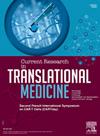白细胞介素-17家族在肿瘤中的免疫生物学功能及治疗应用
IF 3
4区 医学
Q2 MEDICINE, RESEARCH & EXPERIMENTAL
引用次数: 0
摘要
白细胞介素-17 (IL-17)家族细胞因子在免疫反应和炎症过程中起关键作用,显著影响各种生理和病理状况。本文综述了IL-17的免疫生物学功能,重点介绍了其不同的细胞来源,包括T辅助17 (Th17)细胞、γδ T细胞、先天淋巴样细胞(ILCs)、中性粒细胞和自然杀伤T (NKT)细胞,以及信号通路。特别关注IL-17在癌症中的参与,它表现出促肿瘤和抗肿瘤作用,通过各种信号级联如JAK/STAT、NF-κB和PI3K/AKT影响肿瘤增殖、血管生成、转移和耐药。了解这些机制凸显了IL-17作为调节免疫反应和改善癌症治疗的潜在治疗靶点。本文章由计算机程序翻译,如有差异,请以英文原文为准。
The immunobiological functions and therapeutic applications of interleukin-17 family in cancer
Interleukin-17 (IL-17) family cytokines play a pivotal role in immune responses and inflammatory processes, significantly impacting various physiological and pathological conditions. This review explores the immunobiological functions of IL-17, focusing on its diverse cellular sources, including T helper 17 (Th17) cells, γδ T cells, innate lymphoid cells (ILCs), neutrophils, and natural killer T (NKT) cells, and signaling pathways. Special attention is given to IL-17 involvement in cancer, where it exhibits both pro-tumorigenic and anti-tumorigenic effects, influencing tumor proliferation, angiogenesis, metastasis, and drug resistance through various signaling cascades such as JAK/STAT, NF-κB, and PI3K/AKT. Understanding these mechanisms highlights IL-17 as a potential therapeutic target for modulating immune responses and improving cancer treatments.
求助全文
通过发布文献求助,成功后即可免费获取论文全文。
去求助
来源期刊

Current Research in Translational Medicine
Biochemistry, Genetics and Molecular Biology-General Biochemistry,Genetics and Molecular Biology
CiteScore
7.00
自引率
4.90%
发文量
51
审稿时长
45 days
期刊介绍:
Current Research in Translational Medicine is a peer-reviewed journal, publishing worldwide clinical and basic research in the field of hematology, immunology, infectiology, hematopoietic cell transplantation, and cellular and gene therapy. The journal considers for publication English-language editorials, original articles, reviews, and short reports including case-reports. Contributions are intended to draw attention to experimental medicine and translational research. Current Research in Translational Medicine periodically publishes thematic issues and is indexed in all major international databases (2017 Impact Factor is 1.9).
Core areas covered in Current Research in Translational Medicine are:
Hematology,
Immunology,
Infectiology,
Hematopoietic,
Cell Transplantation,
Cellular and Gene Therapy.
 求助内容:
求助内容: 应助结果提醒方式:
应助结果提醒方式:


